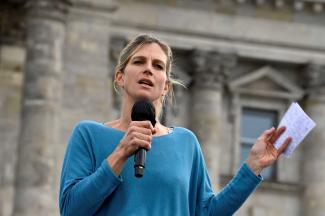Transformation to sustainbility
New mindset needed

Göpel states that the UN Environment Programme has correctly argued that “coordinating a deep and enduring system change is neither a single pathway nor a linear process.” Dynamics can be circular, for example, when a new mindset modifies the rules of a system, but the system also supports the mindset shift. To meet the huge challenges humanity is facing, the author believes that must happen at a huge scale. New rules and incentives can bring about structural change. They can thus serve as crucial mechanisms, exerting a powerful influence on systemic behaviour over time.
As Göpel spells out, a new aim or purpose slowly but surely becomes normative in a successful transformation. For example, the meaning of “growth” is redefined, and that change then reinforced by various institutions, in social relations and people’s minds.
The political economist explains: “For me it is not so much that we have to find an alternative to freedom and prosperity, or even growth. We have to reclaim their meaning for a world with nine billion instead of one billion people”. People today, she adds, lack spiritual guidance. Production and consumption have been commodified and more homogenous, but the potential for satisfying needs has not increased.
Göpel calls for a “Second Enlightenment” in the 21st century – an allusion to the 18th century movement that sought to overcome obstacles to progress through rational thinking, placing scientific knowledge above religious belief. Göpel considers more enlightened attitudes essential in the following areas:
- “Progress” should not be measured only in monetary terms. It must be equitable and balanced, so differentiated social, environmental and cultural indicators are needed.
- “Freedom” should not be understood as the absence of obstacles to individual consumption; it should embody human security and contentment, including freedom from the fear of falling behind in the race for resources and the freedom from the endless want that has become embedded in our culture, hindering our well-being.
- “Prosperity” should not mean ever more consumption. It can signify a holistic understanding of human needs and diversified strategies of need satisfaction.
- “Economic growth” should not be an end in itself. Different types of output and activity serve the purpose of good living within planetary boundaries.
Göpel appreciates that many of the UN’s Sustainable Development Goals (SDGs) are in line with these principles. Nevertheless, she is critical of the way they dogmatically propagate GDP growth and greater incomes even for the rich.
Reference
Maja Göpel, 2016: The Great Mindshift.
https://link.springer.com/content/pdf/10.1007%2F978-3-319-43766-8.pdf
Sabine Balk is a member of the editorial team of D+C Development and Cooperation / E+Z Entwicklung und Zusammenarbeit
euz.editor@dandc.eu














